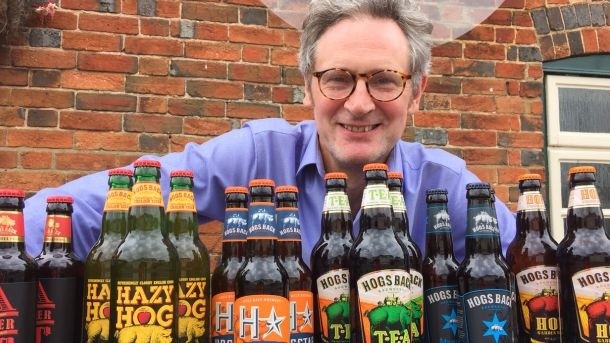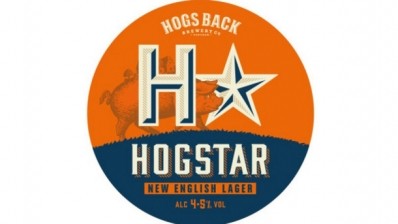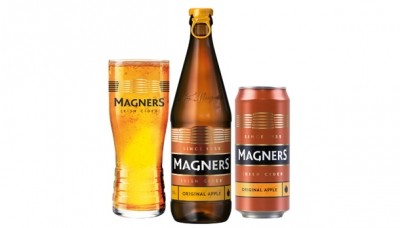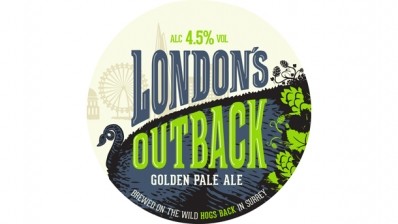The Big Interview
"We ignored the focus groups because it felt right" - Interviewing Rupert Thompson of Hogs Back Brewery

If you want to know where the UK beer market is headed, you could do worse than follow Rupert Thompson. Late last year, in teeming rain of course, he was picking his way through the stripped bines in his brewery’s own half-acre hop garden.
This was where he harvested the first commercial crop of Farnham White Bine for some 85 years. It will be showcased in a number of special beers over the coming months.
That anyone would go to such trouble to create a point of difference for a local brewer like Hogs Back — and we haven’t even got on to the chocolate lager — should tell you something about how far beer has come in the past few years.
And if it doesn’t, Thompson will tell you himself. “It’s the most exciting time I’ve known in my 35 years in the brewing business,” he says.
And he’s certainly had plenty of excitements.
Carling, for instance, might not have held its position as Britain’s best-selling beer if, as brand director at Bass, Thompson hadn’t noticed the “blindingly obvious” — that at 4% abv it was stronger than its rivals and delivered more taste.
He highlighted the fact on cans and in a £300,000 ad campaign that declared it ‘Your best bet for a fuller flavour’, reversing the brand’s decline. Other mainstream lagers were forced to increase their strength landing the Treasury, Thompson calculates, a £20m duty windfall.
“I feel proud of that,” he says. “I should have got a commendation from the Chancellor!”
Bass
But he didn’t stop there. At Bass he’d also pioneered TV ads for pubs, and Oxford brewer Morland hired him to look after its tenanted estate. He was distracted, though, by a little 3,000 barrel-a-year cask ale called Old Speckled Hen.
He relaunched it in a 500ml clear glass bottle at a daring 5p premium over the key competitor, Newcastle Brown Ale, and advertised it on the front pages of quality broadsheets.
“That hadn’t been done before. It gave a sense that here was a beer that was more serious, high quality. We tried to price it the same as Stella Artois. It was 5.2% abv too, but an ale had never been priced that high.
“Really it was intuition. We ignored the focus groups because it felt right.”
And it was an immediate success. Old Speckled Hen became the best-selling premium ale in UK supermarkets. “It showed a bottled beer could be as authentic as a cask ale, the next best thing, and it helped kick-start the whole premium bottled ale sector, like Magners did for cider. We had to build a new brewery because of it, and that doesn’t often happen!”
When Morland’s success attracted a takeover by Greene King, Thompson launched his own company, Refresh UK, initially to sell the former Ushers brewery brands.
Then the chance came to buy Wychwood Brewery, already famous for Hobgoblin ale.
Marstons
Thompson doubled capacity at the Oxfordshire plant and started contract brewing, including for Marstons, which eventually acquired the business.
“It was fantastic that they kept the brewery going — there were other options,” says Thompson. “I was determined not to sell to someone who would close it and we didn’t get the highest price, but it was a good price.”
And so, after a gap, came Hogs Back. Founded in 1992 during an earlier surge of microbrewery development, Thompson liked it because it was close to London and had a well-respected brand in TEA, or Traditional English Ale.
“I didn’t want to work in a big company again. I like being involved in what’s going on. The excitement for me is in growing a business, or it’s just about managing a business and I can’t get excited about that.”
Craft
Importantly, Hogs Back was a true local brewer, rooted in the community, and had “more substance than style”, unlike the new wave of craft brewers.
“Too many are doing the ‘urban cool’ thing, and you have to ask how sustainable it is to have 200 breweries opening in a year while there are 20 pubs closing every week, the beer market is static and supermarkets don’t want to work with smaller brewers.
“The problem with over-supply is that people will start discounting, there’ll be no investment in quality or in supporting outlets, and quality starts to drop. It feels like we’re heading for a crash and it’s best to recognise that and start managing it, to take proactive steps.”
So Hogs Back is investing, and it’s innovating. Thompson began by tweaking recipes and repackaging the existing range to make it fresh and modern, drafting in Miles Chesterman from Molson Coors as head brewer to help create beers for a changing marketplace.
Lager
Among them is Hogstar, a ‘new English lager’, which, true to its name, is beginning to shine in the portfolio and is on draught in about 100 pubs in London and Surrey.
“I’d wanted to have a lager since the Wychwood days,” he says. “Lager is going to be a very important part of the future of brewing in the UK. There are many brewers replicating Continental styles, but I wanted to do it as if we were starting from scratch.”
Hogstar features five different hops from England, North America and continental Europe, added at different stages in the brew. It’s lagered for at least four weeks then cold conditioned at half-a-degree centigrade. The result is a distinctive lager with a deeper flavour than most.
“It has a signature taste that’s not easy for others to replicate,” says Thompson.
Chocolate
Montezuma, the chocolate lager, was developed with the eponymous chocolate company. Rather than using highly-roasted malts to get the flavour, Montezuma is made with distilled, fatless chocolate, added during maturation. It’s an ingenious solution and, amazingly, it works — in that you can taste lager and chocolate at the same time.
The latest creation is Hopping Hog IPA, a less aromatic and citrussy take on the style than US IPAs, giving the company a range of 18 brands including a cider, Hazy Hog.
Innovation goes alongside developing strong partnerships with trade customers. Thompson cites Mitchells & Butlers’ Castle group and multiple operator Red Mist Leisure as good examples. “It’s important we deal with people who respect us,” he says.
“Some pubcos are inconsiderate. They see it as a brutal and simple commercial transaction, and you get to the point where that’s not worth having.”
For Thompson this is linked to the proliferation of new microbrewers that encourage pub operators to be fickle.
Buyers
“When you’ve 300 brewers queuing up to be on your bar, buyers are rewarded for being disloyal and inconsiderate, and publicans think they have to rotate beers all the time.
"I understand there needs to be some rotation, but pub customers want to know a beer they like will still be on sale next time they visit. New beers are not always what they’ve come for. A pub should be like stepping into a warm pair of slippers.
“I believe licensees must hold their nerve and trust old loyalties. The market has to settle down at some point and they’ll need brewers they can rely on, who will support them and work with them and give them a sustainable supplier base.
“It’s an important message, I think,” he adds. “Build a long-term relationship with a brewer based on both your interests.
“After all, would you change your butcher every week?”






